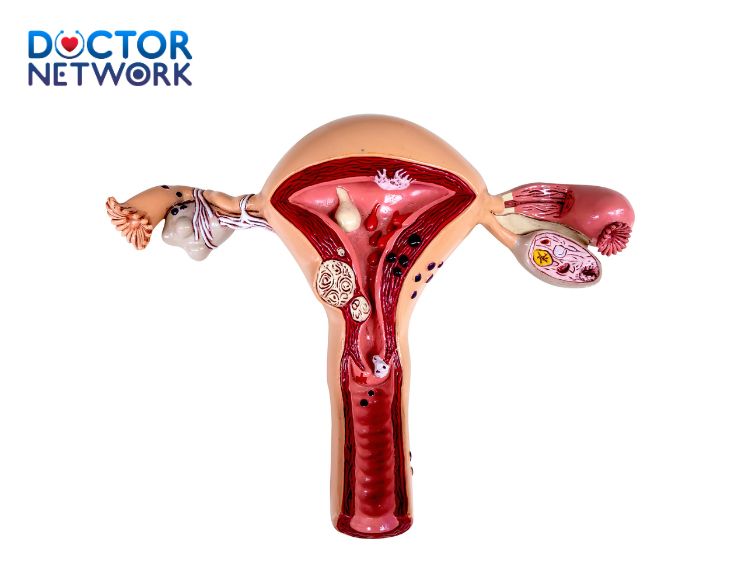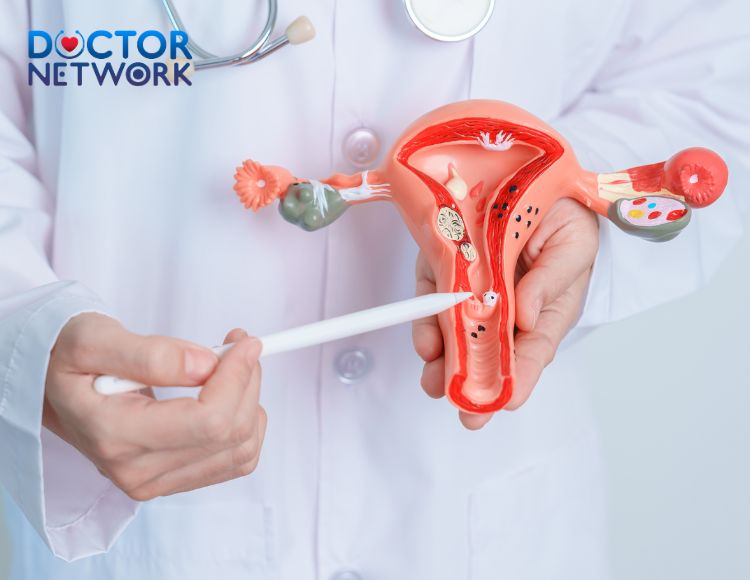Surely, many women have experienced the anxiety of being “have a late period but no signs of pregnancy“. In fact, a delayed period can result from various factors, not always related to pregnancy. Let’s explore the common causes of delayed periods and appropriate ways to handle this situation in the article below.
What is a Delayed Period? What Does It Mean to Be Late Without Signs of Pregnancy?
- A delayed period is when menstruation does not occur according to the expected cycle. A normal menstrual cycle typically lasts between 21-35 days. A woman is considered late if she doesn’t have her period beyond her longest cycle length.
- “have a late period but no signs of pregnancy” means that you are late but pregnancy tests come back negative, and you do not have typical pregnancy symptoms like nausea, breast tenderness, or changes in appetite.
Causes of Late Periods Without Pregnancy
There are many reasons why women might experience a delayed period without pregnancy. Some of the most common include:
Menstrual Disorders
- Polycystic Ovary Syndrome (PCOS) – have a late period but no signs of pregnancy: A hormonal disorder causing small cysts to form in the ovaries, leading to irregular or absent periods.

A hormonal disorder causing small cysts to form in the ovaries, leading to irregular or absent periods
- Hypothyroidism/Hyperthyroidism: An underactive or overactive thyroid can disrupt hormone balance, causing menstrual irregularities.
- Oligomenorrhea, Amenorrhea: Conditions where periods are infrequent, light, or absent.
Lifestyle Changes
- Stress – have a late period but no signs of pregnancy: Prolonged psychological stress affects the brain areas controlling hormones, leading to menstrual irregularities.
- Intense Exercise: Excessive physical activity, especially among athletes, can cause hormonal imbalances.
- Significant Weight Changes: Sudden weight gain or loss can disrupt the body’s balance, leading to delayed periods.

Sudden weight gain or loss can disrupt the body’s balance, leading to delayed periods
Medication Effects
- Birth Control Pills: It may take a few cycles for the body to adjust after stopping the pill.
- Medications for Chronic Conditions – have a late period but no signs of pregnancy: Some drugs for conditions like hypertension or mental health can have side effects that affect the menstrual cycle.
Other Health Issues
- Uterine Fibroids – have a late period but no signs of pregnancy: Benign tumors in the uterus can affect the menstrual cycle.
- Pelvic Inflammatory Disease: Infections that can lead to irregular menstruation.
- Perimenopause: Hormonal fluctuations as women approach menopause.
Associated Symptoms to Watch For
In addition to being late for your period without pregnancy signs, some women report other symptoms such as:
- Lower abdominal pain
- Changes in vaginal discharge
- Breast tenderness
- Bloating and changes in bowel habits
- Mood swings
When to See a Doctor?
You should consult a specialist if you experience:
- A period that is significantly overdue (beyond one full cycle)
- Persistent irregular periods
- A delayed period accompanied by other unusual symptoms

See doctor when you have a delayed period accompanied by other unusual symptoms
- Plans to conceive
Diagnosis and Treatment
To pinpoint the exact cause of a delayed period, a doctor may:
- Conduct a pregnancy test: urine test, blood test (hCG), or ultrasound.
- Perform tests for menstrual disorders: assess thyroid function, reproductive hormone levels.
- Provide counseling and suggest treatment based on the underlying cause.
Expert Advice
- Don’t stress too much as anxiety can further delay your period. Try stress-relief techniques.
- Monitor your menstrual cycle regularly to detect any abnormalities early.
- Avoid self-medicating without knowing the cause of your delay.
- Have regular gynecological check-ups.
FAQs About “have a late period but no signs of pregnancy”
1. How many days of delay confirm no pregnancy? There isn’t a specific number of days to definitively confirm no pregnancy. Menstrual cycles vary. The best way to confirm is through a pregnancy test or a delayed period test (hCG blood test) after about a week of delay. Late conception can sometimes cause a negative pregnancy test even within the delayed cycle.
2. What are common non-pregnancy related causes of delayed periods? Common causes include:
- Menstrual disorders: PCOS, thyroid issues…
- Stress
- Sudden weight changes
- Intense physical activity
- Medication side effects
- Health issues (pelvic inflammation, uterine fibroids…)
3. Is a delayed period without pregnancy dangerous? A delayed period without pregnancy is usually not dangerous if it happens occasionally. However, persistent delays, irregular cycles, or accompanying unusual symptoms may indicate underlying health issues needing medical attention.
4. How to regulate the menstrual cycle? First, identify the primary cause of the delay. A specialist may suggest treatments such as:
- Lifestyle changes (managing stress, adjusting weight…)
- Treating underlying health issues
- Prescribing medication to regulate the cycle.
5. Can delayed periods resolve on their own? In some cases, delayed periods can resolve on their own, such as when caused by temporary stress or lifestyle changes. However, if delays occur frequently or due to medical conditions, medical intervention may be necessary.
Scientific Evidence Related to “have a late period but no signs of pregnancy”
1. Menstrual Disorders:
- Polycystic Ovary Syndrome (PCOS): Studies in the Journal of the American Medical Association (JAMA) show that PCOS affects 17-25% of women of reproductive age, a common cause of delayed periods and amenorrhea. The CDC indicates PCOS can lead to fertility issues, higher risks of cardiovascular disease, and type 2 diabetes.
- Hypothyroidism: Research in the Journal of Endocrinology notes that hypothyroidism reduces estrogen and progesterone production, leading to menstrual irregularities, including delayed periods. The American Thyroid Association states that hypothyroidism affects about 4.5% of adults in the US, with women at higher risk than men.
2. Stress:
- Studies in Fertility and Sterility show that stress impacts the hypothalamic-pituitary-ovarian axis, causing hormonal imbalances and delayed or missed periods. The Journal of Psychosomatic Medicine reports that women with high stress levels are 2.5 times more likely to experience delayed periods than those with lower stress levels.
3. Lifestyle Changes:
- Intense Exercise: Research in Sports Medicine indicates that female athletes training at high intensity may experience menstrual irregularities, including delayed periods. Health experts recommend balanced training and rest to maintain reproductive health.
- Weight Changes: Studies in the Journal of Nutrition suggest that sudden weight gain or loss can affect hormone levels, causing menstrual disruptions. Maintaining a healthy weight through a balanced diet and regular exercise is crucial for a healthy menstrual cycle.
References:
https://www.ncbi.nlm.nih.gov/books/NBK459251/
https://www.mayoclinic.org/diseases-conditions/hypothyroidism/symptoms-causes/syc-20350284
Kiểm Duyệt Nội Dung
More than 10 years of marketing communications experience in the medical and health field.
Successfully deployed marketing communication activities, content development and social networking channels for hospital partners, clinics, doctors and medical professionals across the country.
More than 6 years of experience in organizing and producing leading prestigious medical programs in Vietnam, in collaboration with Ho Chi Minh City Television (HTV). Typical programs include Nhật Ký Blouse Trắng, Bác Sĩ Nói Gì, Alo Bác Sĩ Nghe, Nhật Ký Hạnh Phúc, Vui Khỏe Cùng Con, Bác Sỹ Mẹ, v.v.
Comprehensive cooperation with hundreds of hospitals and clinics, thousands of doctors and medical experts to join hands in building a medical content and service platform on the Doctor Network application.

























